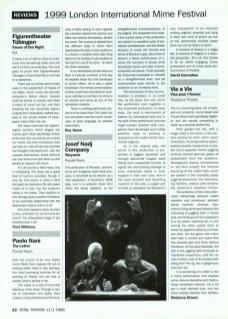This production of Woyzeck, presented by the Hungarian Josef Nadj company, is described by its director as a 'free adaptation of Buchner's 1836 play’, and it is certainly freed from either the literal narrative, or the straightforward characterisations, of the original. The characters that inhabit the surreal world of this production are locked in a repetitive cycle of proletarian pointlessness, and the artistic decision to evoke the themes and sense of Buchner's play, rather than to present a literal performance of it, allows the company to devise some remarkably bizarre and often intensely beautiful set pieces. These episodes are frequently impossible to interpret on a straightforward level, and yet communicate quite directly to the audience on an emotional level.
This directness of this communication is enabled, in no small way, by the great skill with which the performers work together in this ensemble production. In many ways, the work is reminiscent of Derevo (in conceptual style and in the skill of the performers) and one might wonder whether both companies have developed such subtly powerful ways of working in response to life under former communist regimes.
As in the original play, the action in this production is presented in jagged episodes and through splintered images: sand falling from suspended funnels to signify the excruciating passage of time; characters caked in mud, trapped in their own lives; and in the most beautiful and disturbing moment in the play, a caged pair of birds (a metaphor for Woyzeck's own entrapment in an inhuman military regime) wheeled and sang in their own kind of prison as one of the performers trickled water from his hat for them to drink.
A moment of beauty in a tragic life. A moment of tragedy in a beautiful production. All in all, this proved to be an utterly engaging, funny, provocative and at times quite profound piece of theatre.

